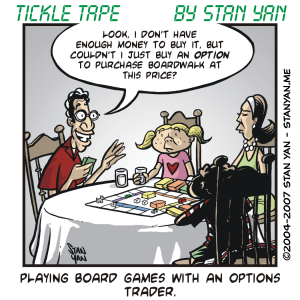Steve has just made a losing trade. Although he’s only down 2%, he can’t stop thinking about it: “What did I do wrong? How could I have prevented this loss? What am I missing here? What does this loss mean for me as a trader? What’s going to happen next? Can I handle it?” Steve’s a ruminator. He can’t just let it go. He persistently mulls over the loss, playing it over and over again in his head. Ruminating about a past loss not only intensifies a bad mood, but a recent study by Dr Andrew Ward and colleagues demonstrates that ruminators are less satisfied, less confident and less committed to planned courses of action, compared to non-ruminators.
People differ on the extent to which they ruminate. Some people don’t ruminate at all; they may deny or avoid thinking about their bad feelings, vent their feelings to friends and confidants, or take clear and specific action to change the circumstances that bring about the bad feelings. Whatever strategy they use, unnecessarily dwelling on the problem is not one of them. Ruminators, in contrast, repeatedly focus on the meaning, causes, and consequences of their bad moods. Engaging in these strategies usually intensifies the bad mood, adversely influencing problem-solving ability, attention and concentration. Such an approach isn’t conducive to skilful trading, where a calm, relaxed, and focused problem-solving approach is crucial.
In their study, Dr Ward and colleagues diagnosed and classified university students as either ruminators or non-ruminators. Each participant was then asked individually to develop a specific plan to solve a pressing university-wide problem, such as how to solve a housing shortage. Participants were asked to present their plans to a member of a university planning committee.
In contrast to non-ruminators, during their presentations, ruminators were less satisfied, less confident, and less committed to their plans. In addition, they said in their presentation that they needed additional time in order to seek out new information and to revise their plans. In summary, those with a ruminative personality style were so debilitated by their rumination that they couldn’t make a commitment to a specific course of action. Rather than moving forward, they were stuck and paralyzed.
As a trader, it’s imperative that one quickly commits to a reasonable trading plan and takes decisive action. But some traders second guess their trading plan and hesitate, missing an important move in the market. The ruminative personality style may explain why some traders experience this malady. Are you a ruminator? It’s essential that you determine if you have this personality trait, and if you do, gain awareness of it, and make every effort to work around this problem. Self-awareness is key.
Once you know you have a problem with rumination, you can develop a plan to manage it. It’s not easy to change a ruminative personality style; if you have one, you’ve probably developed the habit of ruminating about your emotions over many years. But this tendency can be controlled. Carefully monitor your thought processes, and when you find yourself ruminating, remind yourself that by doing so, you will intensify your bad mood and that in turn, will interfere with your concentration, and reduce your ability to think of creative solutions to trading problems.
Some psychologists suggest that a ruminative person immediately yell, “stop” when they find themselves ruminating. This usually halts the repetitive and incessant need to over-analyze one’s mood. In contrast to a non-ruminator, questioning one’s decisions and over-analyzing them isn’t productive, and it is necessary to remind oneself that he or she is making no progress by doing so. Over time, and through practice, it’s possible for a ruminator to take quick and decisive action, instead of being paralyzed by a hard decision or a recent trading loss. So if you are a ruminator, don’t make a trading loss worse by dwelling on it too much. Identify the problem, develop a method to control it, and don’t let a ruminative style interfere with making confident, committed trading decisions.


